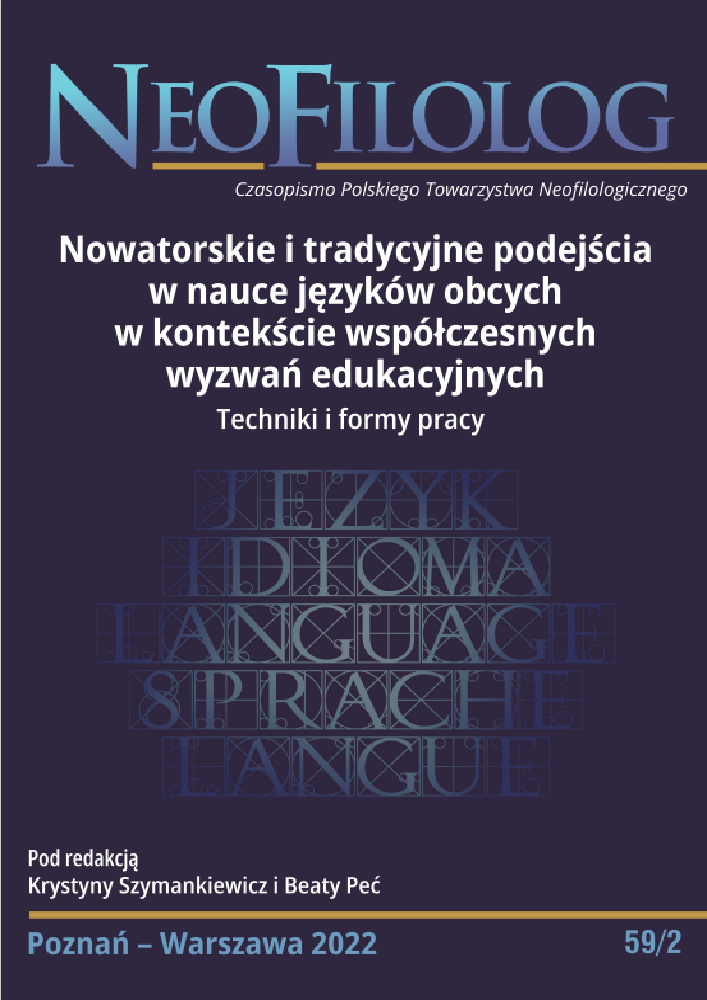Abstract
The following paper addresses online learning in the Covid-19 pandemic and focuses on foreign language learning in the context of foreign language courses in higher education. The aim of the study is to investigate e-courses which the pandemic caused to become a substitute for face-to-face courses. Interviews were conducted with students from the University of Gdańsk and the Academy of Music in Gdańsk to find out their opinions. The research findings showed that organisation-related aspects, such as time saved, convenience or the ability to work professionally and study at the same time, were recognised as positives of online learning, while the actual educational goals, such as effectiveness, motivation and group collaboration, were seen rather as negatives of the situation. The work of teachers and their commitment were viewed positively. We did not recognise any major differences between online teaching and face-to-face interaction in this respect.
References
Alvarez Gil F.J., Alonso-Almeida F. (2022), Los estudiantes prefieren clases presencialey examenes virtuales. Online: https://theconversation.com/ensenanza-de-idiomas-los-estudiantes-prefieren-clases-presenciales-y-examenes-virtuales-175359 [accessed 15.11. 2022].
Błaszkowska H., Krenz-Brzozowska (2021), Nauczanie zdalne na kierunku lingwistyka stosowana - między koniecznością a wyborem. "Neofilolog", No 57/ 2, pp. 281-294. https://doi.org/10.14746/n.2021.57.2.8
Chłopek Z. (2022), On-line testing and assessment of young adult learners of foreign languages: challenges and solutions, (in:) Gabryś-Barker D., Kalamarz R. (eds.), Współczesna glottodydaktyka wobec zmian edukacyjnych. Nowe wyzwania i innowacyjne rozwiązania, Katowice: Wydawnictwo Uniwersytetu Śląskiego, pp. 155 -170.
Danieluk M. (2019), Wykorzystanie nowoczesnych technologii w nauczaniu. Model SAMR. Online: https://nowoczesnenauczanie.edu.pl/wp-content/uploads/ 2019/03/Model-SAMR.pdf Davidson R.J., McEwen B.S. (2012), Social influences on neuroplasticity: Stress and interventions to promote well-being. "Nature Neuroscience", No.15 (5), pp. 689-695. https://doi.org/10.1038/nn.3093
Granjon Y. (2021): La perception de l'enseignement à distance par les étudiants en situation de confinement: premières données. "Distances et Médiations des Savoirs", No. 33/21, CNED-Centre national d'enseignement à distance. Online : http://journals.openedition.org/dms/6166. [accessed 3.08.2022]. https://doi.org/10.4000/dms.6166
Hodges C., Moore S., Lockee B., Trust T., Bond A. (2020), The difference between emergency remote teaching and online learning. "Educause Review", No. 27, pp. 1-12.
Janus A. (2020), Refleksje z pierwszych dni i pierwszych wrażeń, (in:) Czarkowski J.J., Malinowski M., Strzelec M., Tanaś M. (eds.), Zdalne kształcenie akademickie w czasie pandemii, Warszawa: Wydawnictwo DiG, pp. 15-25.
Jarynowski A., Czopek K., Paradowski M. (2021), Keep your friends close: przyswajanie języka obcego poprzez interakcje rówieśnicze a edukacja zdalna w dobie pandemii. "Acta Neophilologica", No XXIII (2), pp. 115-131. https://doi.org/10.31648/an.6660
Krajka J., Białek K. (2021), O stylach dydaktycznych w edukacji zdalnej w teorii i praktyce. "Języki Obce w Szkole", No 1, pp. 5-15.
Maghni A., Belamhitou M., Abouzaid B., Chetuami, S. (2022), Enseignement à distance au temps de la covid-19 au Maroc: quels leviers pour la transformation pédagogique et numérique de la profession enseignante à l'université. "International Journal of Trade and Management", No. 1 (1), pp. 11-26.
Półtorak E., Gałan B. (2020), Rola nowych technologii w procesie nauczania - uczenia się języków obcych. Perspektywa ucznia, (in:) D. Gabryś-Barker, R. Kalamarz (eds.), Postrzeganie i rola motywacji w procesie glottodydaktycznym. Perspektywa nauczyciela i ucznia. Katowice: Wydawnictwo Uniwersytetu Śląskiego, pp. 181-195.
Puentedura R. (2013), SAMR Getting to Transformation. Online: http://www.hippasus.com/rrpweblog/archives/2013/04/16/SAMRGettingToTransformation.pdf [accessed 03.08.2022].
Pyszczek G. (2020), Między przekazem a perswazją - wokół socjologii edukacji on-line w czasie epidemii, (in:) Czarkowski J.J., Malinowski M, Strzelec M, Tanaś M. (eds.), Zdalne kształcenie akademickie w czasie pandemii. Warszawa: Wydawnictwo DiG, pp. 53-66.
Szerszeń P. (2014), Platformy (glotto)dydaktyczne. Ich implementacja w uczeniu specjalistycznych języków obcych. IKL@ Wydawnictwo Naukowe Instytutu Kulturologii i Lingwistyki Antropocentrycznej Uniwersytet Warszawski.
Szerszeń P. (2017), Komunikacja w środowiskach e-learningowych, (in:) Allnajjar J. (ed.), Komunikacja w organizacjach. Teoria i praktyka. Saarbrücken: Wydawnictwo Bezkresy Wiedzy, pp. 171-192.
Szerszeń P. (2018), Na czym polega "lingwistyczna inteligencja" współczesnych systemów glottodydaktycznych? Adaptywność w skali mikro- i makro w obecnych rozwiązaniach e-learningowych. "Applied Linguistics Papers", No. 25/1, pp. 61-72. https://doi.org/10.32612/uw.25449354.2018.1.pp.61-71
Szerszeń, P., Romanowski P. (2018), Do contemporary e-learning solutions support the development of intercultural competence? Insights from European projects. "Journal of Pedagogical Research", No. 2, 3, pp. 192-202.
https://ug.edu.pl/news/pl/3103/rozwoj-kompetencji-jezykowych-w-czasie-nauki-zdalnej-badania-cjo-ug [accessed 8.08.2022].
https://ksztalceniezdalne.psrp.org.pl/ [accessed 20.06.2022].
https://naukawpolsce.pl/aktualnosci/news%2C393594%2Cbritish-council-zajecia-jezykowe-na-uczelniach-to-prowizorka.html [accessed 5.08.2022].
https://pie.net.pl/wp-content/uploads/2021/02/Raport-PIE-Cyfrowe_wyzwania.pdf [accessed 24.11.2022].
License
Copyright (c) 2022 Jolanta Hinc, Adam Jarosz

This work is licensed under a Creative Commons Attribution-NoDerivatives 4.0 International License.
Authors
Authors of texts accepted for publication in Neofilolog are required to complete, sign and return to the Editorial team’s office the Agreement for granting a royalty-free license to works with a commitment to grant a CC sub-license.
Under the agreement, the authors of the texts published in Neofilolog grant Adam Mickiewicz University in Poznań a non-exclusive, royalty-free license and authorize the use of Attribution-NoDerivatives 4.0 International (CC BY-ND 4.0) Creative Commons sub-license.
The authors retain the right to the free disposal of the work.
Users
Interested Internet users are entitled to use works that have been published in Neofilolog since 2017, under the following conditions:
▪ attribution – obligation to provide, together with the distributed work, information about the authorship, title, source (link to the original work, DOI) and the license itself.
▪ no derivatives – the work must be preserved in its original form. Without the author's consent, it is not possible to distribute the modified work in the form of translations, publications, etc.
Copyrights are reserved for all texts published since 2017.
Miscellaneous
Adam Mickiewicz University in Poznań retains the property right as a whole (layout, graphic form, title, cover design, logo etc.).

